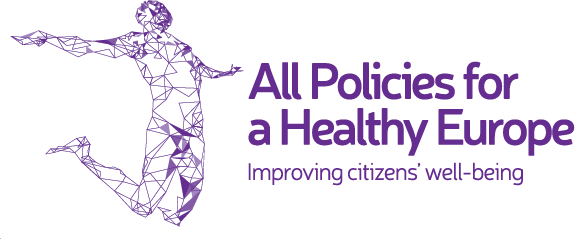AP4HE’s position on EU4Health
- 26 Oct 2021
- Opinions
All Policies for a Healthy Europe (AP4HE) believes that well-being must be at the centre of EU priorities. To date, the concept of well-being has not been systematically embedded in EU policies and action. Different Directorates-General within the Commission define well-being in relation to their respective departmental priorities, reinforcing departmental silos. There is an urgent need to agree and apply a consistent definition of well-being across policy areas, which would improve policy coherence and highlight connections between different sectors.
The multi-dimensional nature of well-being requires action across sectors and, crucially, collaboration between different policy areas and digital inclusion is a key aspect towards it. Digital literacy and skills, as well as access to the internet, play an increasingly important role in people’s well-being. Therefore, investment in digital inclusion is essential to avoid creating new societal inequalities based on “digital divides”, related to age, socio-economic status and living conditions. At the same time, digital tools can be used to improve access to well-being related services, including health, education and social services.
AP4HE believes that the EU can play a key role in promoting citizen adoption of digital health by addressing socio-economical, technical, legal and organizational barriers, as well as through closer cross-sectoral collaboration with patients, health professionals, the private sector and Member-States. To this end, we first believe that the EU must ensure that its citizens are equipped with the right digital skills to foster public trust and understanding of digital health tools. It is only afterwards, that the creation of a European Health Data Space, crucial to effectively leverage data and drive the benefits of healthcare, becomes feasible.
Digital healthcare is essential to support a necessary paradigm shift where well-being and the maintenance of good health is the primary focus rather than disease management and recovery. Policies in this respect should include education and communication efforts towards citizens to help earn their trust, educate them and make them aware of the advantages that health data and digital tools can bring to their health and well-being. EU4Health must pave this way forward, as wider uptake of digital tools can overcome traditional barriers such as staffing constraints and the lack of resources.
Policymakers often lack reliable data and concrete methods to access and evaluate citizens’ health and well-being. Health data is a key enabler for the digital transformation of healthcare. However, the COVID-19 crisis has clearly shown that there is a lack of unity, coordination, scale and interoperability among European health systems. The pandemic has also shed light on the benefits that better sharing and use of health data can bring to healthcare in the EU. Therefore, AP4HE considers that EU4health must ensure the interoperability and harmonization of all the upcoming EU data spaces with the European Health Data Space. Specifically data on the European Green Deal, agriculture, energy and social balance that directly relate to citizens’ wellbeing. Strengthening the EU's data capacity will be key to understanding the impact of environmental change and its adverse consequences on citizens' health, and to develop indicators of well-being that go beyond GDP and allow the establishment of an economy that has the concept at its basis.
AP4HE's main drive is to achieve a European Economy of Wellbeing. In order to turn this into reality, EU4health program should increase EU and national statistical capacities, enabling evidence-based decision making. It should moreover ensure that well-being indicators are used for monitoring the progress in the Member States to be fed into the national budgetary processes.
EU action on health and social care systems should be underpinned by its citizens' needs and the core European values – in particular, universal health coverage and equitable access to quality health care without discrimination. Measures to address current inequalities in access to care and health outcomes are crucial. For this reason, we suggest the following actions.
- A reform in the European macro-economic policy framework is needed. Well-being indicators should be taken into account in the next Action Plan to implement the European Pillar of Social Rights. This will allow the implementation of a more robust European instrument to monitor Member States' progress on social rights and environmental guidelines within the European Semester, such as a "Macrosocial Imbalance Procedure" and minimum social protection standards.
- The European Semester should incorporate well-being indicators into national budget assessments. Well-being, patient outcomes and healthcare systems performance indicators should be a part of the European Semester and thus of health-related Country Specific Recommendations. Especially the indicators on prevention, digital health literacy, patients outcomes and long-term care should be taken into account. In this context, importance should be given to value and outcomes-based healthcare, focus on maximising patient health outcomes with high quality care. This requires generating and capitalising on more granular outcomes data that help spend more efficiently for health, improve care coordination, reduce treatment duplications, minimise fragmented care pathways, and invest in prevention and early screening.
- The relevant decision makers should be involved in the Semester discussions. The absence of ministries of health poses risks to the governance of health systems reform. It is vital that ministries of health contribute to shaping the policy directions generated. A similar consideration applies to health stakeholders as well. A formal mechanism should be established to allow patient representatives, public health institutes and other health experts to provide input on the health content of the Semester.
The EU urgently needs a new economic model. With the climate emergency and pandemic, there is more than ever a need to establish a system built on reliable and commonly agreed indicators. An Economy of Well-being presents itself as a reliable opportunity to effectively go beyond GDP and reflect the social and welfare reality of the European people and the profound changes that are taking place. EU4Health can contribute to the well-being of European citizens by improving health systems resilience and increasing resource efficiency.

